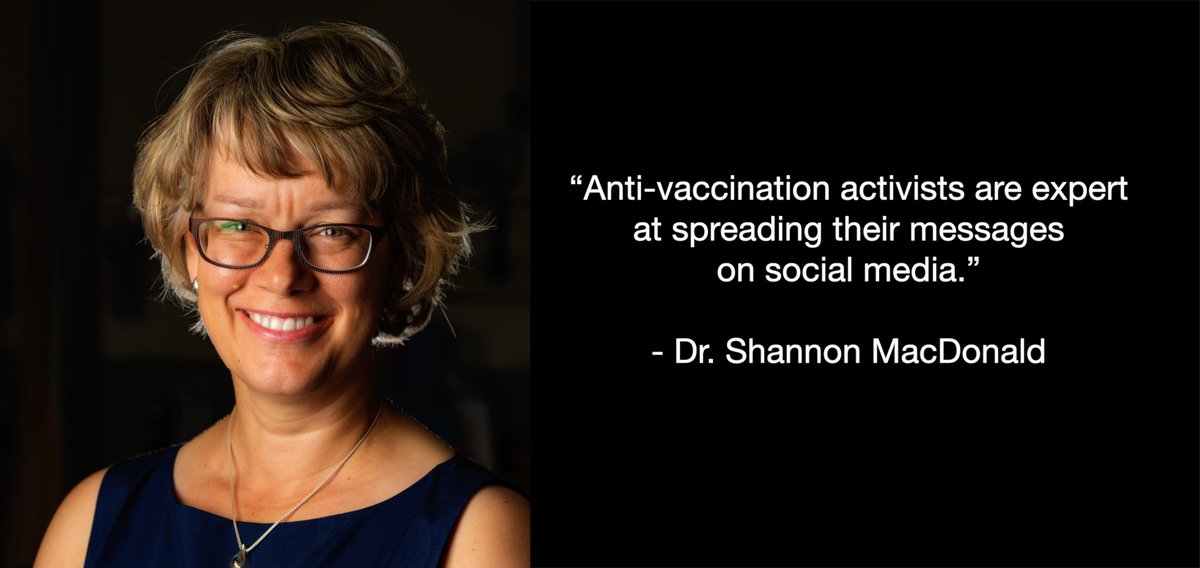The race is on around the world to develop a COVID-19 vaccine, or multiple vaccines (to date, there are between 135 and 150 vaccines in development). While some believe a vaccine is the only solution to our very tentative, largely fearful existence, a number of pressing concerns come to mind:
Are enough people going to get the vaccine to reach the required community immunity?
How has COVID-19 affected routine vaccinations?
Those concerns are shared by University of Alberta Faculty of Nursing Associate Professor, Dr. Shannon MacDonald. In June, she and her research team from the U of A received a $335,000 grant as part of the Canadian Institutes of Health Research COVID-19 May 2020 Rapid Research Funding opportunity. They are one of 139 research teams from across Canada supported by this joint federally/provincially funded program tasked with “accelerating the development, testing, and implementation of measures to mitigate the rapid spread of COVID-19 and its negative consequences on people, communities and health systems.”
To say we’ve all been distracted and worried for the past six months, as a result of the pandemic, is an understatement. And while we know that a return to our former, pre-COVID lives – or as close as we can come – depends on a vaccine, many questions remain: Will a vaccine on such an accelerated development schedule be safe? Will there be enough COVID-19 vaccines for everyone? Will it be safe to go to the doctor’s office or a public health centre to get it?”

Delayed and missed vaccines
It’s this uncertainty, worry and changes in behavior and habits as a result of lockdowns and their effect on routine childhood vaccination rates that Dr. MacDonald and her team will be considering … as well as vaccination rates for pregnant women and older adults. Informal analyses by public health departments across the country indicate that, for a variety of COVID-19-related reasons (primarily pandemic lockdowns), childhood vaccination rates have indeed decreased. And any decrease in childhood vaccination rates is a real cause for concern.
A June 11 National Post article reports that “Vaccination rates among children have dropped by as much as 20% in parts of Canada…” As part of their research, the National Post gathered provincial and territorial data on child and vaccination rates for the months of January to April 2020 and compared it to the same period in 2019. Manitoba and Saskatchewan were the only provinces to provide the National Post with data from 2020. A Manitoba spokesperson attributed a 60% drop in their MMR vaccine rates and a 55% drop in their DTaP vaccine rates (to children aged two to 17) last March-April, to the COVID-19 outbreak.
“We do know that when the pandemic first was declared a lot of provinces had to temporarily halt or alter routine programs,” says Dr. MacDonald. “That’s what we’re looking at right now. In an effort to understand the effect of the pandemic on childhood vaccination rates, we’re collecting data from provincial and territorial public health systems. What are they all doing? What is the impact of their strategies on their vaccine rates?”
“…likely not our last pandemic …”: Strategies for success
To help guide the public health systems, Dr. MacDonald and her team will assess how routine vaccines are being provided in each province and territory during the pandemic, and in Alberta, British Columbia and Quebec, they’ll assess the impact of the pandemic on vaccine coverage levels. “This is likely not our last pandemic,” she adds. “We need to have proven-successful processes in place that we can roll out quickly.”
With an eye to pending COVID-19 vaccines, Dr. MacDonald’s research will “help us understand Canadians’ perceptions and intentions” about COVID-19 vaccines. As they survey a cross-section of the public and health care providers, they’ll ask survey subjects what they think of COVID-19 vaccines and whether they intend to receive the vaccine, when it becomes available.
“We’ll provide this information to the National Advisory Committee on Immunization ,” says Dr. MacDonald, as they develop recommendations for current application, and vaccination guidelines to be implemented directly at the outset of future pandemics.
“NACI has highlighted the importance of continuing infant vaccines, such as the measles and pertussis (whooping cough) vaccines,” Dr. MacDonald explains. “We don’t want to come out of this pandemic and have a measles outbreak.”
Catching up on in-school vaccination clinics
While Dr. Jim Kellner, a Calgary-based pediatric infectious disease specialist sourced for the National Post article noted that most public health clinics and many pediatricians continued to administer vaccinations throughout the lockdowns, the in-school vaccination clinics were stopped.
“School vaccination programs have been hugely impacted,” agrees Dr. MacDonald. “For example, the HPV vaccine – it’s administered in the fall and spring, so this spring’s shots were missed. Many provinces and territories were able to catch up during the summer … Public health agencies contacted parents and set up appointments for vaccines. But there will definitely be catch-up required for kids at school this fall.”
It’s an insidious plot!
At the same time as many families closed ranks and were tightly sequestered within their homes and family units – particularly during the early stages of the pandemic – anti-lockdown protests and rallies soon began and social media has been a-Twitter with talk of COVID conspiracies (e.g., it’s a plot by Bill Gates to get everyone micro-chipped; it was master-minded in a Chinese lab and then distributed worldwide; it’s a mild illness being spread as a cover to the ‘real’ dangers of 5G networks; and on and on …).
In a July 26 article in The Ubyssey, author Shanzeh Chaudry (“Debunking your favourite COVID-19 conspiracy theories”) says, “According to a recent study conducted by the Carleton University School of Journalism in Ottawa, nearly 46% of Canadians believe in at least one COVID-19 conspiracy theory circulating online.”
Those who study vaccine hesitancy – defined as a delay in acceptance or refusal of vaccines despite the availability of vaccine services – and anti-vaccination behaviors/beliefs, are taking a close look at the effect of anti-lockdown propaganda, COVID-19 conspiracy theories and an increasingly suspicious/paranoid view of society (particularly government and government agencies) on perceptions of vaccines.
Capitalizing on a distrust of process with social media savvy
In “How anti-vaxxers could disrupt the cure for the COVID-19 pandemic” (Macleans.ca, July 22, by Aaron Hutchins), University of Guelph philosophy professor and author, Maya Goldenberg, says, “While some anti-vaccination advocates bring up arguments that appear to have basis in science … their claims are really acting as a placeholder for cultural and social anxieties around the process; that is, the organizations and government structures that manufacture, approve and market vaccines.”
“Anti-vaccination activists are expert at spreading their messages on social media,” says Dr. MacDonald. “We need to get in there with correct information to counter the misinformation.” The best place to do that, in Dr. MacDonald’s opinion, is in the same place. “If public health only puts their information on the public health websites, that likely won’t work,” she says. “We need to be in the same places, to refute their statements with medical evidence.”
“I think the real job of public health experts and physicians is going to be really clear communication on the importance of vaccination,” stresses Dr. MacDonald. “We need to think about, and use, non-traditional media sources of communication.”
Dr. MacDonald agrees with the concerns of many experts regarding the potentially even stronger influence of anti-vax messages on people (and parents) in these times of COVID. “For parents who are already vaccine-hesitant, the anti-vaccine messages on social media may further entrench their worries and concerns.”
But don’t over-emphasize the use of non-traditional media, cautions Dr. MacDonald. “We have lots of parents – the majority in fact – who still look to, and prefer, traditional sources for information on vaccines, such as their family physicians and validated government/public health websites, etc.”
Where … and when? NOW
Just as important as where to reach the public with messages of the importance of both childhood vaccinations and COVID-19 vaccination is when. With health experts advising that it will likely be more than a year before approved vaccines are ready, they’re adamant that the time to start the conversations about the importance of getting a COVID-19 vaccine (and getting on track with childhood vaccination schedules) is now. As for the best approach to take with this crucial messaging, previous methods of relying on debunking anti-vax myths or citing scientific facts might not be most effective.
In “How anti-vaxxers could disrupt the cure for the COVID-19 pandemic,” source Eve Dubé, a medical anthropologist at Université Laval in Quebec and former member of a World Health Organization working group on vaccine hesitancy says, “We keep informing people with scientific facts, trying to address misconceptions through statistics and data, but people are much more moved by narrative and stories. I think public health needs to have good stories.”
In the same article, Steven Taylor, author of The Psychology of Pandemics: Preparing for the Next Global Outbreak of Infectious Disease, advises leaders to be “honest and transparent, but on the other hand, you don’t want to offer false hope or announce things prematurely.”
Obviously there are varying thoughts and theories on the most effective methods for reaching people and parents with the “VACCINATE!” message. But the desired end-result is the same.
“I think, basically, we want parents to know that childhood vaccinations are as important now, as they were before,” says Dr. MacDonald. “And they’re as safe as they were before.”
Related Story:
Canadians will get their say on who they think should get any COVID-19 vaccine first, thanks to a research team led by a University of Alberta nursing professor. (Edmonton Journal, November 3, 2020)
Who should get COVID-19 vaccine first is complicated: U of A nursing prof leads research team
Banner photo credit: Angelo Esslinger, Pixabay.com

